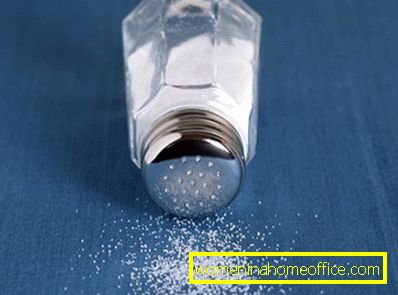The benefits and harm of salt
This question sooner or later rises before you if you are concerned about the state of your health.
Naturists, raw foodists, adhere to a decisive point of view that salt is more harmful to humans and that it is not necessary to salt food. Many other people, support the view that you need to eat the daily rate of salt, however, do not take into account many factors.

The question is quite controversial and there is no definite answer. Go into extremes and completely, Especially sharply exclude salt from the diet is not worth it. But you also need to add some salt to the prepared food., there is enough salt in products, especially canned.
Why does a man need salt?
Table salt, it is sodium chloride, sodium chloride, food salt, stone or sea - these are small crystals of white color, dissolve well in water, it tastes salty. Contains 40% sodium and 60% chlorine.
Sodium in nature is not found in its pure form, but a lot of it is contained in the compound in sea water and rocks (halite, rock salt), from which people extract it.
The habit of salt food appeared long ago, salt has been mined for about 4000 years. Salt is a great preservative. Stimulates the appetite and gives the food a bright, rich taste. The fact is that sodium ions perfectly conduct electrical impulses to the brain through salted taste buds on the tongue, so we feel brighter taste sensations. Therefore, we so want to salt the cooked food.
Half of the sodium in the body is in the extracellular fluid, about 40% in the bones, the rest in the cells and tissues. Sodium is important to us, it helps to maintain a constant amount of moisture in the body, maintains acid-base balance. Overeating or loss of sodium causes, respectively, a delay or loss of water. Both are undesirable.
In addition, sodium ions play the role of transporters of amino acids, sugars and potassium into cells.
How much salt is needed per day?
Scientists have different opinions: from 0.5 to 5 grams of salt per day is necessary for an adult. Norm salt depends on many factors: weight, health, heart function, kidney and circulatory system. From climate and physical activity.
A person may be enough of the amount of salt that he gets from fresh vegetables and greens. If there is no liquid loss, if the menu contains bread, cheese, fish, meat, canned foods, then, most likely, the salt in the diet is already above the norm and there is no need for dosol food.
It should be noted that products prepared industrially already contain sodium: preservatives - sodium nitrate, flavor additives - monosodium glutamate, disintegrating agents - sodium bicarbonate.

It is not necessary and sharply reduce salt in the diet. The body, which is used to actively excreting it with sweat and urine, is not yet able to extract enough natural sodium from the products, as well as retain it in the tissues. He will have to extract sodium from bones and tissues, and this will cause unpleasant consequences for health.
Athletes, sprinters at long distances drink salted water in order to retain water in the tissues and prevent dehydration. In the heat, until acclimatization has occurred, it is useful to use a little more salt and water than usual.
What salt can be dangerous?
- Harm of salt is manifested when it is excessively consumed. Excess, which the body can not assimilate, it is trying to bring, hence a strong feeling of thirst. A lot of salt is a load on the kidneys, as a result of swelling in the tissues, salt deposits.
- Salt does not contain vitamins, nutrients. It is better to use sea iodized salt, it is not in the example of cooking contains a large amount of minerals.
- Salt in the excess causes damage to the kidneys, blood vessels and artery, other internal organs. It causes excess weight.
- Sodium chloride is an inorganic substance and is not absorbed by the cells.
- Increased salt intake is responsible for cardiovascular diseases and high blood pressure. When these ailments prescribe salt-free diet. Japanese and Americans suffer the most from hypertension, heart disease and blood vessels, they are also the main consumers of salt in the world.
Reduce salt in the diet

Discard the salt when cooking and salting the food in the plate. Do not salt salads. At first, eating fresh food will be unusual and difficult, but after 2-3 days the receptors will become accustomed, and you will learn to feel the salt in the products and feel their real taste.
Some scientists believe that sodium chloride is not a very good way to compensate for the sodium deficiency in the body. This is not the kind of natural sodium that fabrics need. However, over the years, sodium is washed out of the soil and plants, and the fruits also lack this substance.
The Chukchi peoples, for example, do not eat salt at all, using dried and frozen meat as food, which already contains the necessary substances and never suffers from sodium deficiency.
But in a warm climate, salt has become an excellent preservative, because putrefactive bacteria do not survive in a salty environment, so salt is widely used in the food industry, the use of salt has become a habit and it is considered that salt is necessary for man.
Learn to use products with natural sodium, which in nature is stored in beets, potatoes, carrots, celery, turnips, sea kale, lettuce. Minerals can be absorbed by our body only in the form of organic substances.
Cheers and do not harm yourself!
Especially for womeninahomeoffice.com.ru - Vera Fedorova